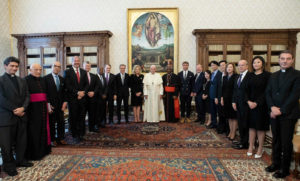For many businesses, their workplaces have recently been carpet bombed by the coronavirus. The resulting destruction has surfaced the following actions that strike fear into every worker’s heart: Furloughs. Pay cuts. Job losses. Working with masks on.
Those actions have led to anxiety, fear, depression, stress, heartache…
What’s missing from those lists is a simple word, but one packed with a lot of power.
Grace. What is that?
According to the Catechism of the Catholic Church, “Grace is favor, the free and undeserved help that God gives us to respond to His call to become children of God, adoptive sons, partakers of the divine nature and of eternal life.”
In a time of crisis, a business leader’s character is revealed. Two stories I recently saw on the news illustrate two differing points of view on character and reveal exactly what I mean about grace.
In a time of crisis, a business leader’s character is revealed.
One story, in the April 13, 2020, edition of The New York Times, charted reactions to the economic downturn by some of the corporations that last year signed the Business Roundtable, a document that promised a commitment by business leaders that “Americans deserve an economy that allows each person to succeed through hard work and creativity and to lead a life of meaning and dignity.” With that in mind, they urged “leading investors to support companies that build long-term value by investing in their employees and communities.”
According to the article, key signers of the document “are furloughing employees, paying dividends to shareholders and provoking complaints from workers that they aren’t adequately protected from danger. … In the run-up to the crisis, many companies used cash to buy back their shares and pay out dividends, rewarding shareholders, while leaving themselves with fewer resources to aid workers when disaster struck.”
The article cited Marriott International, the world’s largest hotel chain, which last year earned $1.2 billion, as an example of a company that signed the document and also furloughed employees, while paying more than $160 million in quarterly dividends and seeking a raise for its CEO, Arne M. Sorenson, who declined to be interviewed for the story. A Marriott spokesman said that he was “unfortunately tied up and unavailable.”

Contrast that story, and the character revelations contained in it, with the mindset of Mario Salerno, the owner of residential and commercial properties in the Williamsburg section of Brooklyn. He is landlord to around 200 tenants in 80 apartments. He heard from a lot of people that, because of the coronavirus’ impact on their lives, resulting in multiple losses of jobs, they would not be able to make their rents.
So he posted signs on all his properties that said he was waiving their rents for the month of April and added: “Stay safe, help your neighbors & wash your hands!!!”
The reasoning for his charitable action was simple. He wanted his tenants to have “peace of mind,” but also: “As a human, I felt a lot more comfortable making sure they that they had food on their table, which several of them didn’t.”
When a reporter asked him how much he was losing financially, Salerno responded: “That’s irrelevant to the value of human life.”
St. Augustine defined grace this way: “Grace not only makes known to people what they ought to do, but also enables them to perform with love the duty that they know.”
Salerno’s mindset is one of grace. But where does one get that grace? A clue can be found at his work place, an auto body shop and gas station where Salerno has a shrine that reflects his Catholic faith. He said it was his faith that compelled him to make the decision to waive the rents for a month. “I don’t really look at it as being a hero,” he said. “I look at it as being a human.”
One tenant called him “amazing’’ for his act of charity.
Grace is often missing in many business leaders’ vocabularies, actions and work places. But when it’s present, it is amazing.




